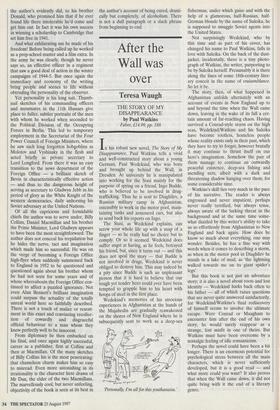After the Wall was over
Teresa Waugh
THE STORY OF MY DISAPPEARANCE by Paul Watkins Faber, £14.99, pp. 188 In his robust new novel, The Story of My Disappearance, Paul Watkins tells a vivid and well-constructed story about a young German, Paul Wedekind, who was born and brought up behind the Wall, in Dresden. At university he is manipulated into working for the Stasi mainly for the purpose of spying on a friend, Ingo Budde, who is believed to be involved in drug- trafficking. Thus he is sent to Diaghilev, a Russian military camp in Afghanistan, ostensibly to work in the motor pool, main- taining tanks and armoured cars, but also to send back his reports on Ingo.
The Stasi, as Wedekind explains, can screw your whole life up with a snap of a finger — so he really had no choice but to comply. Or so it seemed. Wedekind does suffer angst at having, as he feels, betrayed his friend, but, since it turns out — and this does not spoil the story — that Budde is not involved in drugs, Wedekind is never obliged to destroy him. This may indeed be a pity since Budde is such an unpleasant person that it is hard to believe that our tough yet tender hero could ever have been tempted to grapple him to his heart with hoops of steel in the first place.
Wedekind's memories of his atrocious experiences in Afghanistan at the hands of the Mujahedin are gradually reawakened on the shores of New England where he is subsequently sent to work as a deep-sea `Personally, I'm all for this youthanasia.' fisherman, under which guise and with the help of a glamorous, half-Russian, half- German blonde by the name of Suleika, he is supposed to smuggle Soviet agents into the United States.
Not surprisingly Wedekind, who by this time and as part of his cover, has changed his name to Paul Watkins, falls in love with Suleika. On the back of the dust- jacket, incidentally, there is a tiny photo- graph of Watkins, the writer, purporting to be by Suleika herself. Presumably it is there along the lines of some 18th-century liter- ary conceit in the name of vraisemblance. So let it be.
The story, then, of what happened in Afghanistan unfolds alternately with an account of events in New England up to and beyond the time when the Wall came down, leaving in the wake of its fall a cer- tain amount of far-reaching chaos. Having survived a Conrad-style storm on the high seas, Wedekind/Watkins and his Suleika have become rootless, homeless people whose reality exists only in their past, which they have to try to forget, however brutally it may continue to thrust itself on our hero's imagination. Somehow the pair of them manage to continue an outwardly peaceful existence, deep-sea fishing and mending nets, albeit with a dark and threatening shadow hanging over them, for some considerable time.
Watkins's skill lies very much in the pace of his narrative. The reader is always engrossed and never impatient, perhaps never really terrified, but always tense, always aware of the lurking threat in the background and at the same time some- what dazzled by this writer's ability to take us so effortlessly from Afghanistan to New England and back again. How does he know so much about everything, one may wonder. Besides, he has a fine way with words when it comes to describing a storm, as when in the motor pool in Diaghilev he stands in a lake of mud, as 'the lightning walked towards me on its giant spider's legs'.
But this book is not just an adventure story; it is also a novel about roots and lost identity — Wedekind harks back often to his father — all of which raises questions that are never quite answered satisfactorily, for Wedekind/Watkins's final rediscovery of himself seems to involve the ultimate escape. Were Conrad or Maugham to encounter him after the end of his own story, he would surely reappear as a strange, lost misfit in one of theirs. But Watkins must have been overcome by a nostalgic feeling of idle romanticism.
Perhaps the novel could have been a bit longer. There is an enormous potential for psychological stress between all the main characters, which is never sufficiently developed, but it is a good read — and what more could you want? It also proves that when the Wall came down, it did not quite bring with it the end of a literary genre.


























































 Previous page
Previous page